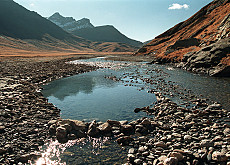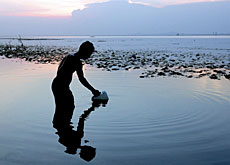Experts seek to preserve Europe’s water tower

The Swiss have much to learn from other countries about the value of their abundant water reserves, according to a leading specialist.
Christoph Plattner, chief scientific officer at the Mountain Water Network, tells swissinfo why the Swiss do not always appreciate this important natural resource that could be managed better.
Plattner was taking part in the Mountain Water Network’s third annual meeting, held in Visp, canton Valais, on Friday.
The network was originally set up in 2003 by Switzerland’s mountainous regions to raise awareness about the importance of water through research work, public campaigns and innovative water projects.
swissinfo: The theme of this year’s meeting was the value of water. Do you think the Swiss recognise the value of the water flowing out of their taps?
Christoph Plattner: In general I think they do, but they are unable to compare it with other things. No one knows how much is spent in Swiss francs on monthly water usage, for example.
We have enough water and we don’t seem too concerned, but I’m sure this will change in the future.
swissinfo: Switzerland is known as the “water tower of Europe”, with six per cent of the continent’s freshwater reserves. What are the main water management challenges?
C.P.: Water is managed quite efficiently in Switzerland but it’s organised sectorially. This means the hydropower sector produces power and the water suppliers supply water to the population, but there are no major discussions between them.
I think we should take a more integrated view of water and the way it’s managed, looking at it by catchment area.
Integrated river basin management would help provide transparent rules for decision making if there are conflicts over water.
swissinfo: How can Switzerland use its water resources more effectively to ensure its long-term economic and social development?
C.P.: I’m convinced that we should take a look at the sanitary situation, as it’s currently based on a mixed piping system and too much water is used to have waste purified at treatment plants.
It would be much wiser to have another system that separates waste from drinking water instead of re-purifying waste water.
Our current mixed system is [also] very expensive and I’m not sure how much longer society can afford to maintain it.
swissinfo: Water in Switzerland has long been accepted as belonging to everyone. Is this under threat?
C.P.: Water privatisation will become more important in the future. There are already some Swiss communities with privatised water supply systems.
I’m sure that more and more people will start asking whether privatised water supply systems are cheaper, but for the moment I’m certain the majority of Swiss will remain sceptical about the idea.
swissinfo: By 2050 rising temperatures are expected to put pressure on Switzerland’s relatively abundant supplies of water. What will be the main impacts in terms of water management?
C.P.: The most visible impact will be that the glaciers will have almost disappeared by 2050.
Scientists believe that we will also lose around five to ten per cent of our annual precipitation. You can already see the hydropower sector is getting concerned about their power production.
Conflicts over water between farmers, power companies, eco-systems, and consumers will also become much more intense.
swissinfo: Simon Bradley in Visp
Switzerland has 6% of all freshwater reserves in Europe.
Lakes and reservoirs account for half the stored water, glaciers 28%, groundwater 20% and rivers and dams 2%.
Swiss water companies pump 1.1 billion cubic metres each year; 83% of this is groundwater.
Average daily consumption of water per person in Europe: 150 litres.
Average in the Sahara: 30 litres.
The Mountain Water Network was established in 2003 following a regional conference of mountain cantons: Glarus, Graubünden, Nidwalden, Obwalden, Ticino, Uri and Valais.
The network’s main aim is to raise the importance of water in Swiss alpine regions through scientific collaboration, public awareness and innovative water projects.
Scientific work is carried out by the Federal Institute for Snow and Avalanche Research in Davos.
Other partners include hydropower companies, businesses, environmental groups and the State Secretariat for Economic Affairs.
Every year the network presents a “Swiss Mountain Water Award” for innovative projects that increase the value of water in mountain regions. This year’s award went to the “DoppelPower” project for the production of green energy from natural river flows in canton Glarus.

In compliance with the JTI standards
More: SWI swissinfo.ch certified by the Journalism Trust Initiative










You can find an overview of ongoing debates with our journalists here . Please join us!
If you want to start a conversation about a topic raised in this article or want to report factual errors, email us at english@swissinfo.ch.